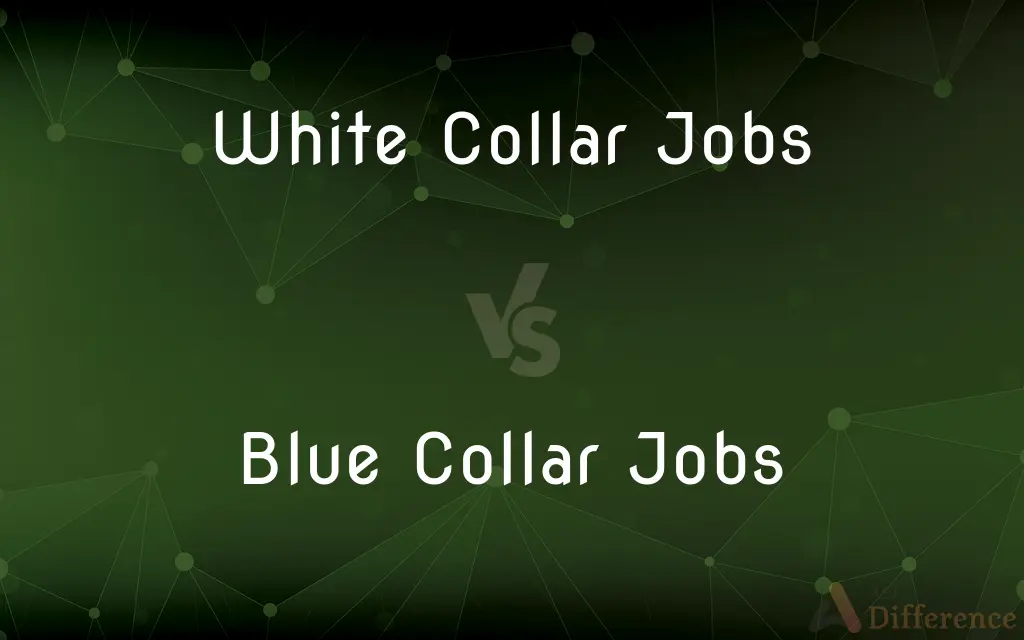White Collar Jobs vs. Blue Collar Jobs — What's the Difference?
By Tayyaba Rehman & Maham Liaqat — Published on March 4, 2024
White-collar jobs typically involve office or administrative work and often require a higher education level, focusing on mental tasks. Blue-collar jobs are generally manual labor roles in industries like manufacturing, construction, and maintenance.

Difference Between White Collar Jobs and Blue Collar Jobs
Table of Contents
ADVERTISEMENT
Key Differences
White-collar jobs are associated with professional, managerial, or administrative work, usually conducted in an office setting. These positions often require a college degree or higher education and are characterized by salaried roles with benefits such as retirement plans and healthcare. Common examples include accountants, lawyers, and IT professionals, where the work is predominantly mental rather than physical.
Blue-collar jobs refer to occupations that involve manual labor and are typically paid hourly or by project completion. These roles often require specific technical skills or vocational training but not necessarily a four-year college degree. Industries with blue-collar jobs include construction, manufacturing, and plumbing. Workers in these fields are often valued for their physical skills and ability to operate machinery or perform labor-intensive tasks.
The distinction between white-collar and blue-collar jobs extends beyond the nature of the work to include educational requirements, job settings, and often, societal perceptions. White-collar roles are generally viewed as more prestigious due to the educational requirements, while blue-collar jobs are respected for their physical expertise and direct impact on infrastructure and physical goods.
Economic trends and technological advancements are blurring the lines between these categories. Automation and artificial intelligence are changing the skill sets required in both sectors, leading to a new appreciation for hybrid skills that encompass both intellectual and technical abilities.
Despite their differences, both white-collar and blue-collar workers are essential to the economy, contributing in various ways to the functioning and advancement of society. The choice between pursuing a white-collar or blue-collar career often depends on individual interests, skills, and educational paths.
ADVERTISEMENT
Comparison Chart
Nature of Work
Mental, administrative, or managerial
Physical labor or manual work
Job Environment
Office settings
Factories, outdoors, job sites
Education Requirements
Higher education (college degree)
Vocational training, apprenticeships
Compensation
Salary, often with benefits
Hourly wages, project-based pay
Examples
Accountants, IT professionals
Electricians, construction workers
Compare with Definitions
White Collar Jobs
Predominantly office-based.
Marketing professionals work in an office planning campaigns.
Blue Collar Jobs
Compensation is often hourly.
Plumbers are paid based on the hours worked or specific projects.
White Collar Jobs
Usually offers salaried positions with benefits.
Many corporate executives receive healthcare and retirement plans.
Blue Collar Jobs
Work environment can be outdoors or in industrial settings.
Mechanics work in garages repairing vehicles.
White Collar Jobs
Often requires a college degree.
Lawyers attend law school before practicing.
Blue Collar Jobs
Work is physically demanding.
A factory worker may operate machinery for long hours.
White Collar Jobs
Work is primarily mental.
A software developer writes code for new applications.
Blue Collar Jobs
Involves manual labor or skilled trade.
A construction worker builds houses.
White Collar Jobs
Jobs involving administrative or professional work.
An accountant prepares financial reports in an office.
Blue Collar Jobs
May require vocational training.
Electricians go through apprenticeships to learn their trade.
Common Curiosities
Which pays more, white-collar or blue-collar jobs?
It varies; some blue-collar jobs can pay more than white-collar jobs, especially with overtime or in high-demand trades.
Can blue-collar jobs require technical knowledge?
Yes, many blue-collar jobs require specialized technical skills and ongoing education in their field.
How are societal perceptions of white-collar and blue-collar jobs changing?
Technological advancements and shifts in economic demand are challenging traditional perceptions, valuing skills and results over job categories.
What are the benefits of white-collar jobs?
Benefits can include higher average salaries, job stability, and perks such as remote work options.
Are white-collar jobs more secure than blue-collar jobs?
Job security depends on the industry, economic factors, and technological changes, not necessarily the job category.
Is it possible to switch from a blue-collar to a white-collar job?
Yes, with additional education or training, individuals can transition between job types, leveraging their experience and skills.
Is a college degree necessary for a successful career?
Not always; vocational training and apprenticeships can lead to lucrative and fulfilling blue-collar careers.
What are the advantages of pursuing a blue-collar career?
Blue-collar careers can offer early entry into the workforce, less student debt, and the satisfaction of tangible results.
How has technology impacted blue-collar jobs?
Technology has introduced new tools and machinery, requiring blue-collar workers to acquire technical skills to operate advanced equipment.
Are there "gray-collar" jobs?
Yes, gray-collar jobs refer to occupations that blend elements of both white-collar and blue-collar work, such as technicians and nurses.
Share Your Discovery

Previous Comparison
Modern vs. Post-Modern
Next Comparison
Gravitational Mass vs. Inertial MassAuthor Spotlight
Written by
Tayyaba RehmanTayyaba Rehman is a distinguished writer, currently serving as a primary contributor to askdifference.com. As a researcher in semantics and etymology, Tayyaba's passion for the complexity of languages and their distinctions has found a perfect home on the platform. Tayyaba delves into the intricacies of language, distinguishing between commonly confused words and phrases, thereby providing clarity for readers worldwide.
Co-written by
Maham Liaqat















































